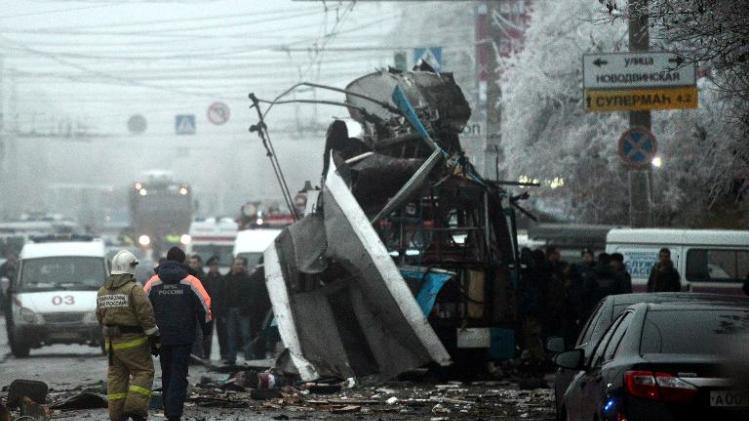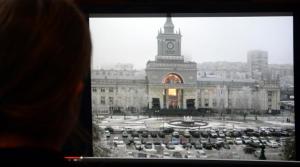
Moscow (AFP) - At least 10 people were killed on Monday in a bombing that destroyed a packed trolleybus in the southern Russian city of Volgograd, a day after 17 people died in a suicide strike on the city's main train station.
The new attack will further heighten fears about security at the Winter Olympic Games which are due to open on February 7 in Russia's Black Sea resort of Sochi, which lies 690 kilometres (425 miles) southwest of Volgograd.
The force of the blast left almost no trace of the trolleybus, which was packed with early morning commuters, and also blew out windows of nearby houses, state television said.
Russian investigators have opened a criminal probe into a suspected act of terror as well as the illegal carrying of weapons, the Investigative Committee said in a statement.
"At 8:10 am (0410 GMT) there was an explosion on trolleybus number 15A in Volgograd. At least 10 people were killed and 15 wounded. The trolleybus was totally destroyed," the Investigative Committee said.
Russia's national anti-terror committee said in a statement that in contrast to Sunday's bombing the blast could have been caused by a bomb left in the centre of the trolleybus, and not a suicide bomber.
But a source told the ITAR-TASS news agency that the latest blast could have been caused by a male suicide bomber.
Volgograd locals in fear
Russian President Vladimir Putin has already been informed of the new attack by Federal Security Service (FSB) chief Mikhail Bortnikov, said Kremlin spokesman Dmitry Peskov. Bortnikov was due to fly to the scene.
State television said that after the latest blast in Volgograd commuters were abandoning buses and trolleybuses and going to work on foot in fear of a new attack.
Speculation swirled on social networking sites that there had been more blasts but the local authorities insisted that was not the case, the RIA Novosti news agency said.
The search for the perpetrators of the blast is expected to focus on Russia's largely Muslim Northern Caucasus region where Islamist militants have for years been fighting the Russian security forces.
A suicide bomber killed 17 people Sunday in the attack on the train station of Volgograd, fuelling security fears just six weeks before the Sochi Olympic Games.
Doku Umarov, the leader of militants seeking to impose an Islamist state throughout Russia's North Caucasus, has ordered rebels to target civilians outside the region and disrupt the Games.
The death toll from Sunday's attack rose to 17 from 16 overnight after another victim died in hospital of his wounds, the health ministry said.
After the attack, Russia's interior ministry said it was immediately stepping up security at all the nation's main train stations and airports.
The city was already attacked on October 21 by a female suicide bomber with links to Islamists who killed six people on a crowded bus.
Hitting the Russian heartland
Militant strikes have become part of daily life in the mainly Muslim North Caucasus. But the Volgograd blasts will be a particular concern to the authorities as the bomber struck a city of more than one million people in the Russian heartland.
The force of the blast left almost no trace of the trolleybus, which was packed with early morning commuters, and also blew out windows of nearby houses, state television said.
Russian investigators have opened a criminal probe into a suspected act of terror as well as the illegal carrying of weapons, the Investigative Committee said in a statement.
"At 8:10 am (0410 GMT) there was an explosion on trolleybus number 15A in Volgograd. At least 10 people were killed and 15 wounded. The trolleybus was totally destroyed," the Investigative Committee said.
Russia's national anti-terror committee said in a statement that in contrast to Sunday's bombing the blast could have been caused by a bomb left in the centre of the trolleybus, and not a suicide bomber.
But a source told the ITAR-TASS news agency that the latest blast could have been caused by a male suicide bomber.
Volgograd locals in fear
Russian President Vladimir Putin has already been informed of the new attack by Federal Security Service (FSB) chief Mikhail Bortnikov, said Kremlin spokesman Dmitry Peskov. Bortnikov was due to fly to the scene.
State television said that after the latest blast in Volgograd commuters were abandoning buses and trolleybuses and going to work on foot in fear of a new attack.
Speculation swirled on social networking sites that there had been more blasts but the local authorities insisted that was not the case, the RIA Novosti news agency said.
The search for the perpetrators of the blast is expected to focus on Russia's largely Muslim Northern Caucasus region where Islamist militants have for years been fighting the Russian security forces.
A suicide bomber killed 17 people Sunday in the attack on the train station of Volgograd, fuelling security fears just six weeks before the Sochi Olympic Games.
Doku Umarov, the leader of militants seeking to impose an Islamist state throughout Russia's North Caucasus, has ordered rebels to target civilians outside the region and disrupt the Games.
The death toll from Sunday's attack rose to 17 from 16 overnight after another victim died in hospital of his wounds, the health ministry said.
After the attack, Russia's interior ministry said it was immediately stepping up security at all the nation's main train stations and airports.
The city was already attacked on October 21 by a female suicide bomber with links to Islamists who killed six people on a crowded bus.
Hitting the Russian heartland
Militant strikes have become part of daily life in the mainly Muslim North Caucasus. But the Volgograd blasts will be a particular concern to the authorities as the bomber struck a city of more than one million people in the Russian heartland.
The city, known as Stalingrad in the Soviet era, is of huge importance to Russians as the scene of one of the key battles of World War II that led to the defeat of invading Nazi forces.
Sunday's blast in Volgograd was the deadliest in Russia since a suicide bombing at Moscow's Domodedovo airport killed 37 people in January 2011.
Investigators said the suicide bomber -- believed to be a woman -- set off her charge after being stopped by a police officer at the metal detectors of the central entrance to the station when it was packed with people travelling to celebrate the New Year.
Unconfirmed news reports identified the bomber as a Dagestani woman named Oksana Aslanova who had been married to two different Islamists killed in battles with federal forces.
However amid conflicting reports, the Investigative Committee said they were examining a theory that the explosion could also have been set off by a male.
Female suicide bombers are often referred to in Russia as "black widows" -- women who seek to avenge the deaths of their family members in the fighting by targeting Russian civilians.






No comments:
Post a Comment